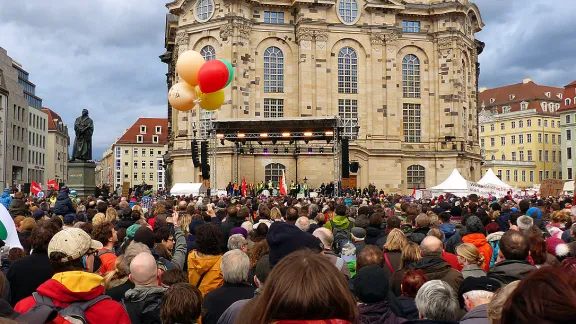
Anti-Pegida: demonstration for openness, humanity and dialogue in front of the Frauenkirche (Church of Our Lady) in Dresden. Photo: Bernd Gross/CC BY-SA 4.0
A Welcome Culture for Refugees and Willingness to Talk
(LWI) – Since October 2014, what are now known in Germany as “Pegida” protests have been taking place in Dresden, the capital of Saxony. PEGIDA is the German acronym for “patriotic Europeans against the Islamization of the West.” The number of demonstrators had dropped, but it is now rising again. In this context, it is time to take a look at the activities of the Evangelical Lutheran Church of Saxony.
The Lutheran bishop and the central church office have written to congregations to encourage them to respond to the current political situation by offering to facilitate talks.
Here is part of the letter:
“The present political situation and the increasingly harder fronts between supporters and opponents of the Pegida demonstrations is preoccupying Christians too, and confronting our church in Saxony with new challenges. On the one hand, Christians from our local churches are involved on both sides—the dividing line runs through groups of friends, families and, indeed, congregations. On the other, many people—Christians and non-Christians—are looking for guidance and wanting to discuss these new political and social developments. We notice that ourselves almost every time we talk to someone, whether privately or at work. And it is becoming clear that at present only one thing will help: we have to talk to one another and keep on talking!
Furthermore, in the congregations we are also feeling the challenges and conflicts in the localities where refugees have already been housed or are due to arrive in group accommodation soon. Besides dealing with anxiety in the population we are witnessing efforts to help and support refugees. Here too: We must talk to one another and keep talking!
On the whole there are still too few places for encounter and conversation. As a church we have facilities and a possibility of giving the encounters and conversations a spiritual framework, thereby bringing biblical standards for guidance into the discussion.”
The letter encourages the congregations to enable opportunities for discussions at the local level and also to invite the public to discussions and events in their church buildings. That way the church could contribute to a dialogue of all citizens. Many moderators, supervisors, pastors and congregational advisors have already offered to support the congregations in facilitating and hosting such discussions.
In addition, the church office has adopted a “guide for promoting a culture of welcome for refugees.” It aims to support congregations and church districts in assisting refugees when they arrive and taking the first steps towards integrating them. Here too, the churches are encouraged to seek opportunities for encounter and discussion around the issues.
In most cases, the activities proposed are meant to be easy to organize by volunteers in the local churches. For example, mentoring, accompanying refugees to public offices, supporting children with school integration or helping to find accommodation and work. Very soon, Saxony’s Lutheran church will appoint six regional coordinators to equip volunteers for targeted, practical assistance to refugees. The coordinators will be responsible for guidance in dealing with refugees and recruiting voluntary multipliers, for project advice and monitoring, keeping in contact with refugees and mediating between them and government offices in the region. A total of EUR 400,000 has been made available for the project fund for refugee assistance.
(Adapted from a press release of the Evangelical Lutheran Church of Saxony)
EVLKS/FH


